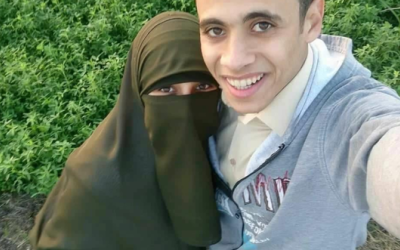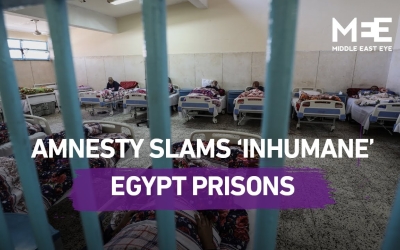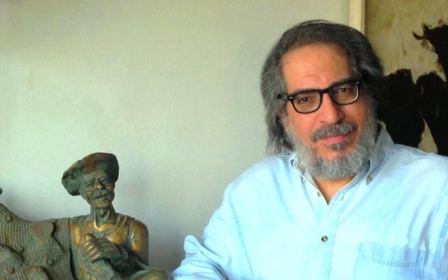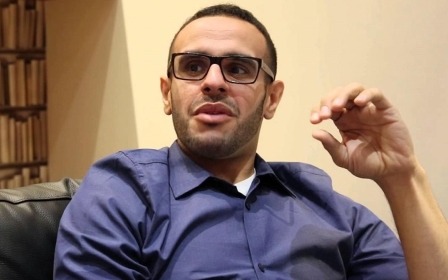US urged to cut military aid to Egypt amid worsening crackdown on dissent
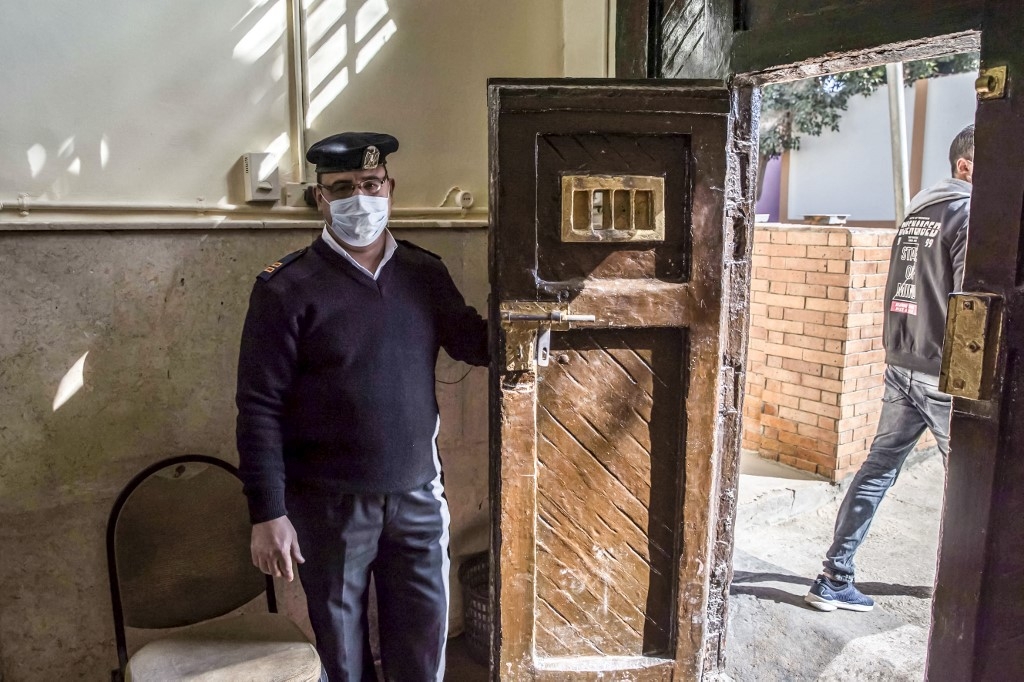
Leading rights advocates have called on the United States to cut military aid to Egypt over President Abdel Fattah el-Sisi's ongoing crackdown against dissidents and activists.
During a webinar hosted by the US Committee to End Political Repression in Egypt on Tuesday, advocates from Amnesty International, Democracy for the Arab World Now (DAWN) and The Freedom Initiative highlighted Egypt's escalating number of political prisoners and the international community's culpability in the government's policies.
They focused specifically on Washington's role in propping up the Egyptian government, given the $1.3bn in US military aid has allocated to the North African country annually.
'From middle-aged Facebook posters to teenage TikTok influencers, prisoners of conscience are regularly disappeared'
- Elliott Colla, Georgetown University
Since Sisi came to power in 2013 following a military coup against Mohamed Morsi - the country's first democratically elected president - hundreds of people have been forcibly disappeared and held incommunicado.
It is estimated that between 70,000 and 100,000 have been detained as Egypt continues to operate with the support of the United States and other western allies.
New MEE newsletter: Jerusalem Dispatch
Sign up to get the latest insights and analysis on Israel-Palestine, alongside Turkey Unpacked and other MEE newsletters
Hussein Baoumi, an Egypt and Libya researcher at Amnesty International who spoke during Tuesday's webinar, said those numbers could be much higher.
"The Egyptian authorities have gone to great lengths to hide the number of political prisoners that are held in Egypt," Baoumi said.
"No one really knows because Egypt is extremely untransparent about these practices and goes to great lengths to silence families and human rights defenders who talk about that issue," he added.
'Americans do not have to pay for this'
Elliott Colla, an associate professor in the Department of Arabic and Islamic Studies at Georgetown University, highlighted other indicators of increased detention, such as the ongoing creation of new detention facilities.
"The regime's appetite for bodies is so voracious that since 2016 it has constructed 30 new penitentiaries to hold them all," Colla said.
According to Amnesty, citing local NGOs, an average of three to four people are abducted and arbitrarily subjected to enforced disappearance each day in Egypt.
"From middle-aged Facebook posters to teenage TikTok influencers, prisoners of conscience are regularly disappeared, locked in solitary confinement, held without trial and denied access to food, healthcare and family visits - torture is widespread," Colla continued.
"Despite this, western countries continue to maintain warm relations with the Egyptian state," he said. "Things do not have to be this way, Americans do not have to pay for this, Egypt should be free."
Late last month, US Secretary of State Antony Blinken told his Egyptian counterpart that that human rights would be "central" to ties between Cairo and Washington, but advocates are sceptical.
Sarah Leah Whitson, executive director of Dawn, stressed the importance of taking immediate action to bring an end to massive and continuous US military aid, as she said the monetary support equates to US support for Egypt's anti-human rights policies.
"Our government and our tax dollars are not passive observers to what happens in Egypt," Whitson said. "We are actively aiding and abetting the oppressive abuses in Egypt."
"America's military and economic aid, coupled with the diplomatic support that we provide gives the Sisi dictatorship political protection and political support," said Whitson, who is also the former executive director of the Middle East and North Africa division at Human Rights Watch (HRW).
Whitson also stressed that the United States' continued monetary support of the Egyptian government - the second-largest recipient of US military aid - flies in the face of international humanitarian law, as well as US federal law.
Protecting US interests?
The Leahy law, introduced in 1997, prohibits both the US Defense and State Departments from providing military assistance to foreign security force units that violate human rights with impunity.
In addition, the US Arms Export and Control Act stipulates that "no security assistance may be provided to any country, the government of which engages in a consistent pattern of gross violations of internationally recognized human rights".
"What's happening in Egypt is our responsibility and it's a simple proposition, we should stop harming the people of Egypt because that's what human rights law requires and that's what US law requires," Whitson said.
'Tax dollars are wasted on a bloated defence machine raining rubble all over the Middle East'
- Sarah Leah Whitson, DAWN
Whitson also slammed "decades old" arguments regarding the need to protect US interests in the Egypt as not being able to withstand "any serious scrutiny".
"What US military aid is really about is maintaining US domination and control over the entire Middle East region, part and parcel of the expanded global domination by the United States all over the world, with more military bases in more countries, more sanctions on more countries, than all the other countries of the world combined," she said.
"This is about the failed and outdated strategy of US empire, which hasn't served the people of the region and hasn't served Americans - whose tax dollars are wasted on a bloated defence machine raining rubble all over the Middle East," Whitson continued.
She also argued that US prioritisation of Israeli security should no longer be accepted as any sort of defence for its continued military aid to Cairo.
"Israel no longer needs to bribe Egypt to maintain their peace, their alliance is closer than our alliance with each of them," she said, citing joint military operations between Egypt and Israel in the Sinai, the coordinated closure of Gaza, and Egyptian use of deadly force to stop migrants from entering Israel on its behalf.
"Ending US military assistance does not mean ending US relations with Egypt," Whitson continued. Instead, those calling for the end to massive annual military aid to Egypt urged the US "to normalise relations with Egypt" by accepting the loss of certain perks provided by aid, such as overflight rights of access to the Suez Canal, both of which most countries pay for on a per use basis.
'A breach of US sovereignty'
Mohamed Soltan, president of The Freedom Initiative, spoke about how he was shot, beaten and tortured during the 643 days he had been held in an Egyptian prison before his 2015 release.
Soltan, an American citizen who has since launched a lawsuit in the US against the Egyptian government over his detention and torture, highlighted Cairo's strategy to punish the families of those who speak out.
Last month, in apparent retaliation to the lawsuit that was filed last year, Egyptian authorities raided the homes of six of Soltan's relatives, including two cousins uninvolved in politics, and detained them. His father has also been taken in secret and held incommunicado.
Soltan called the arrests of his cousins and the disappearance of his father "a breach of US sovereignty".
"This is the Egyptian regime reaching into the United States and trying to silence me and trying to deter me from my constitutionally protected right to raise a lawsuit," he said. "If we don't have an appropriate reaction to this as a government, what happens is it gets normalised".
Soltan said that "not a single person" associated with his torture and imprisonment had been accountable, and instead described the ways in which police, politicians, judges and officials who act more harshly toward human rights defenders are rewarded rather than reprimanded.
"You're elevated up in the system if you're more ruthless, if you're voluntarily oppressing, if you're voluntarily going with the overall Sisi agenda, and that's really scary," he said.
Soltan alleged that a large factor behind the continued policies of the Egyptian government stems from the leadership being "continuously rewarded" via military and economic aid, despite funder countries being very aware "that the entire system is corrupt".
While Soltan said that the US and Europe "are egging on this regime and are giving it the legs of legitimacy that it needs", he stressed the importance of individuals and groups putting pressure on the Egyptian government to reform its policies.
"I was sentenced to life in prison; I wouldn't be here today if it wasn't for the advocacy of those people," he said.
"We don't know which one person will make a difference," he continued. "Someone getting released out of prison can have a huge impact both domestically and abroad and there is a lot for us to do."
Middle East Eye delivers independent and unrivalled coverage and analysis of the Middle East, North Africa and beyond. To learn more about republishing this content and the associated fees, please fill out this form. More about MEE can be found here.


